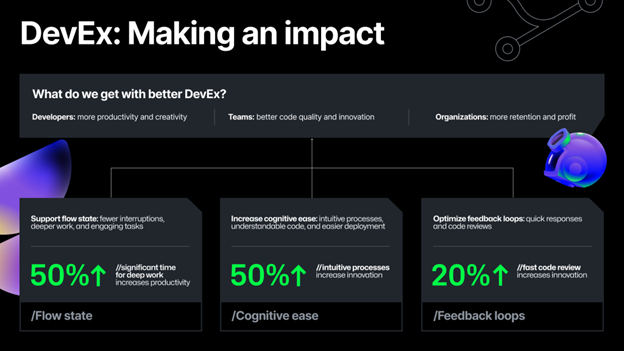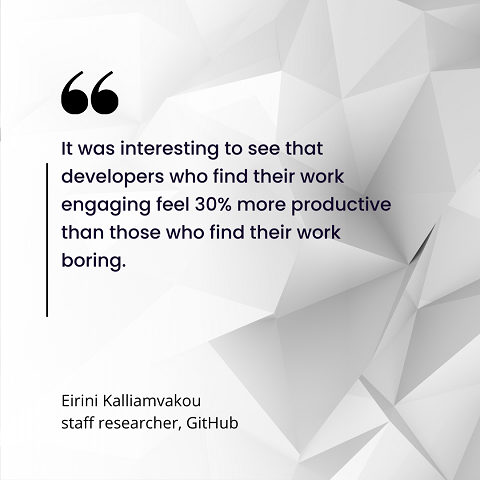GitHub Research Quantifies How Developer Experience Drives ResultsGitHub Research Quantifies How Developer Experience Drives Results
Improving developer experience, or DevEx, improves the "flow state" and helps developers be more engaged, leading to better business outcomes.

In recent years there has been a lot of discussion about the benefits of DevOps as a way to improve business outcomes and overall productivity. What might well be even more important, however, is the emerging understanding around developer experience, or DevEx.
GitHub this week published groundbreaking research providing concrete data on how developer experience impacts productivity and innovation. While tech leaders have intuitively known DevEx is critical, GitHub's study statistically validates this belief.
Key findings from the report include:
Developers in a deep "flow state" — a place where developers can work faster, get creative, and spend their time building great software — are 50% more productive. Minimizing distractions and allowing uninterrupted focus time pays off.
High code understanding links to 42% greater productivity. Good documentation, training, and contextual awareness enable developers to work efficiently.
50% more perceived innovation comes from intuitive processes. Reducing friction through better tools and workflows boosts creativity.
Fast feedback loops drive 20% higher innovation. Rapid collaboration and build cycles accelerate development.
Quick answers to questions cut technical debt by 50%. Comprehensive documentation prevents duplication of efforts.

DevEx
Creating Engaging Work Improves DevEx
No one wants to be bored at work, certainly not developers.
"It was interesting to see that developers who find their work engaging feel 30% more productive than those who find their work boring," Eirini Kalliamvakou, staff researcher at GitHub, told ITPro Today. "Intuitively, it makes sense that when we engage more with our work we make more progress and feel productive, but verifying it statistically and measuring how much of a difference engaging work makes was a pleasant surprise."
Often developers are resigned to thinking that a specific task, no matter how boring, just needs to be done, and they don't think about the implications if this pattern continues, Kalliamvakou noted.

Kalliamvakou-GitHub
"We can't eliminate less interesting work from our repertoires, but it pays off for engineering managers and leaders to design the work of their teams in a way that ensures that less desirable tasks are spread across folks, avoiding having the same team members exclusively doing boring work," she said.
Challenges for Implementing DevEx
There are multiple challenges impacting the developer experience today.
Kalliamvakou said engineering leaders and business executives want to know how investing in improving DevEx — through tooling or streamlining organizational processes — will affect their desired outcomes, since they are comparing this investment against others they can make in their organization.
"Not having data and suggestions for specific metrics to track improvements can prevent a DevEx initiative from ever getting off the ground in an organization," she said.
The other challenge that Kalliamvakou said is common is organizations being unsure about how to measure and track DevEx over time. Developer satisfaction surveys are a key tool, and the GitHub research shares surveys for organizations to repurpose and adopt.
How to Improve DevEx
To gain benefits from DevEx, Kalliamvakou suggests that engineering leaders focus on getting developers into the flow state.
They should also focus on making collaboration and onboarding easier, giving teams the space to communicate and collaborate efficiently, with fully accessible development environments and tools to break down silos, she added.
"Lastly, open doors for developers to drive broader impact, providing the means for developer teams to increase customer satisfaction and focus on R&D and experimentation," Kalliamvakou said.
Kalliamvakou recommends that for organizations looking to improve their own products, tools, and processes to improve DevEx, engineering leaders should:
Experiment quickly and responsibly with AI coding tools to uncover points of friction and maximize productivity.
Create dedicated teams within the enterprise to ensure maximum productivity and that collaboration is an accelerator of productivity (i.e., what percentage of discussions are answered across the org chart; what percentage of pull requests come from certain repos).
Refine processes like planning meetings and retrospective sessions to keep teams collaborative without adding friction.
GitHub doesn't just do research on DevEx; it has its own internal DevEx team dedicated to understanding, improving, and monitoring the developer experience at the company.
"The goal is to reduce the time it takes for our developers to execute their workflows, finding ways to improve the build process, optimize deployments, and tune tests to execute more efficiently," Kalliamvakou said.
About the Author
You May Also Like








.jpg?width=700&auto=webp&quality=80&disable=upscale)
